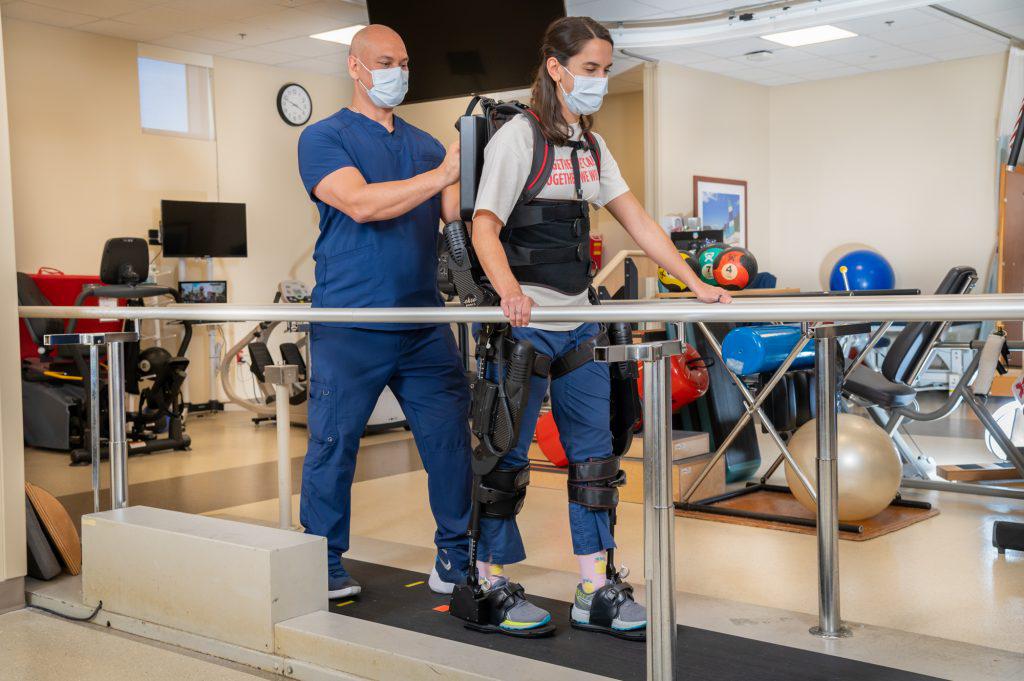For many people who have suffered a neurological injury such as a stroke, movement disorder or brain injury, regaining movement and function can be a challenge, although it generally can be overcome through a combination of rehabilitation and medication. But a stroke patient getting behind the wheel and driving again? Here in South Florida?
A unique service available in the region exclusively from Baptist Health aims to put patients back in the driver’s seat and safely back on the road to independence and normal daily living.
Elizabeth Matalon, director of rehabilitation services at Baptist Hospital and West Kendall Baptist Hospital, says Baptist Health is the only healthcare organization in South Florida to offer the service.
Isabel Maestu, occupational therapist, explains that it’s important for patients to regain not just their driving skills but also the sense of independence that comes with being able to drive to the grocery store, visit family and friends or return to work. “We help patients re-learn how to drive using a combination of clinical evaluation and on-road driving instruction with a specially modified car equipped with assistive devices,” she says.
According to Ms. Matalon, specialized services such as these have earned Baptist Health specialty accreditation in stroke, brain injury and cancer from CARF (Commission for Accreditation of Rehabilitation Facilities), which she calls the “international gold standard” for neurological rehabilitation facilities.

Baptist Health’s neuro-rehabilitation program encompasses a busy, 23-bed in-patient facility at Homestead Hospital staffed by nurses and clinical partners, and an outpatient center at Baptist Hospital, which is equipped to treat up to 150 patients a day. “The large majority of patients are here as a result of neurological conditions,” Ms. Matalon says.
Using technology to help neuro-rehab patients
Ms. Matalon says that neuro-rehabilitation patients at Baptist Health benefit from the latest equipment and technologies, all designed to help them regain normal function and return to their daily activities as quickly as possible.
At Homestead Hospital’s in-patient neuro-rehabilitation facility for example, patients use a sophisticated assistive device – dubbed “The Transformer” by hospital staff – which features a computer-controlled, exoskeleton-like frame. “The device is strapped to the patient, allowing them to walk,” explains Ms. Matalon. “As they become stronger every day, the computer backs off on the assistance provided, putting more of the effort back on to the patient until they can once again walk on their own, unassisted.”
Another device, the Vector, is a computer-assisted harness worn by the patient, who is “tethered” to a machine overhead that can adjust how much of one’s body weight meets the ground. This, Ms. Matalon says, provides safety and support for patients as they start practicing to walk again.
“Gait issues and unsteadiness are very common with stroke patients,” Ms. Matalon continues. “The Vector is a weight-supported gait treatment that alleviates the risk of falling for these patients. It improves mobility and balance, promotes faster recovery for reduced length of stay and minimizes risk to both patients and clinicians.”
The in-patient neuro-rehabilitation unit at Homestead Hospital also has virtual reality TV screens that place patients in simulated environments, and a model Publix grocery store where they can practice lifting canned foods and other actual items from shelves, placing them in their cart and then on to the check-out counter. Cognitive skills are assessed and strengthened in the program, too, says Ms. Matalon.
All of this requires a team of skilled therapists, Ms. Matalon notes, adding that Baptist Health today has the best group of therapists she’s ever worked with in her 37 years with the health system. “They’re all certified in different specialties, including our neuro specialist who is certified by the American Physical Therapy Association,” she says. “We also have a clinical educator whose job is to help our therapists increase their skill level and provide even better care for our patients.”
Every patient receives an individualized treatment plan, according to Ms. Matalon, and is treated by a licensed therapist, not an aide. “We’re compassionate and we treat our patients like family,” she says, noting that family members are actively encouraged to participate along with the patient. “We go out of our way to help patients re-integrate into daily activities, and we’ve seen so many great outcomes here.”
Tags: Baptist Hospital, Commission for Accreditation of rehabilitation Facilities, Elizabeth Matalon, Homestead Hospital, Isabel Maestu, Miami Neuroscience Institute, neuro-rehabilitation, West Kendall Hospital




